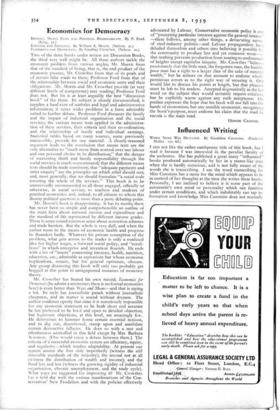Economics for Democracy
INCOMES, MEANS TESTS AND PERSONAL RESPONSIBILITY. By P. Ford. (King.5s.) EARNING AND SPENDING. By William A. Morris. (Nelson. 2S.) ECONOMICS FOR DEMOCRATS. By Geoffrey Crowther. (Nelson. as.) Two of the three books under review are Discussion Books, the third very well might be. All three authors tackle the economic problem from various angles; Mr. Morris from that of the standard of living, that is, the end product of the economic process, Mr. Crowther from that of its poals and of certain false roads to these; Professor Ford from that of the relationship between social and economic units and their obligations. Mr. Morris and Mr. Crowther provide (at very different levels of competence) easy reading; Professor Ford does not. But his is at least arguably the best "discussion book" of the three. Its subject is closely circumscribed; it supplies a hard core of statistics and legal and administrative information; it raises wider problems in a form admirably suited to further debate. Professor Ford discusses the family and the impact of industrial organisation and the social services; the various means tests applied in the administration of these services, their criteria and their co-ordination; and the relationship of family and individual earnings. Statistical tables based on many sources, some previously inaccessible, provide his raw material. A closely-reasoned argument leads to the conclusion that means tests are the only alternative to "much more State control over our labour and our personal choice in its distribution;" that the danger of weakening thrift and family responsibility through the social services is much overestimated; that the different means tests should be made consistent; that "adequate payments and strict enquiry" are the principles on which relief should rest; and, most generally, that we should formulate "a social code covering the whole of the services." This book is to be unreservedly recommended to all those engaged, officially or otherwise, in social service; to teachers and students of practical economics; and, indeed, to all citizens to whom this thorny political question is more than a party debating-point.
Mr. Morris's book is disappointing. It has its merits; there has never been so simple and comprehensible an outline of the main facts about national income and expenditure and the standard of life represented by different income grades. There is some sound common sense about restriction schemes and trade barriers. But the whole is very dull, and when the author turns to the means of economic health and progress he flounders badly. Whatever his private conception of the problem, what gets across to the reader is only a confused plea for higher wages, a forward social policy, and "conditions" in which enterprise and invention flourish. He ends with a list of "musts" concerning incomes, health, nutrition, education, etc., admirable as aspirations but whose economic implications, remain, but for general optimism, obscure. Any group discussing this book will only too probably get bogged at this point in unsignposted morasses of monetary theory.
Mr. Crowther has beated his own record; Economics for Democrats (he admits a misnomer; there is no formal economics here) is even better than Ways and Means—and that is saying a lot. Its style has journalistic punch without journalistic cheapness, and its matter is sound without dryness. The author confesses openly that since it is notoriously impossible for any economic statement to be both short and accurate he has preferred to be bri;:f and open to detailed objection; but legitimate objections, at this level, are amazingly few. He determines to hammer home certain essential notions, and to dig out, disembowel, stamp upon and annihilate certain destructive fallacies. He does so with a zest and effectiveness unrivalled in this field except by Mrs. Barbara ootton. (One would enjoy a debate between them.) The criteria of a successful economic system are efficiency, equity, and regularity—which implies adaptability. At present our system attains the first only imperfectly (witness the still miserable standards of the majority); the second not at all (witness the distribution of wealth and income); and the third less and less (witness the growing rigidity of industrial organisation, chronic unemployment, and the trade cycle). What ways are suggested for improving it? Mr. Crowther has a field day with the various manifestations of the Conservatives' New Feudalism and with the policies effectively advocated by Labour. Conservative economic policy is one of' protecting particular interests against the general interest" —there follows, among other things, a devamting surve■ of steel-industry politics—and Labour propagandists have deluded themselves and others into believing it possible for the community to produce less and yet consume more— that nothing prevents production from soaring to undreamedof heights except capitalist iniquity. Mr. Crowther "believes passionately that the little man, the forgotten man, the humble poor man has a right to a larger slice of the cake of material wealth," but he refuses on that account to endorse wholly pernicious errors as to the right way of securing it. One would like to discuss his points at length, but that pleasure must be left to his readers. Accepted dogmatically as the last word on the subject they would certainly require criticism; but he explicitly warns against any such acceptance. His preface expresses the hope that his book will not fall into the hands of economists; but any sensible economist, recognising the book's purpose, must endorse his claim that the road he travels is the main road.
HONOR CROONIE.






















 Previous page
Previous page